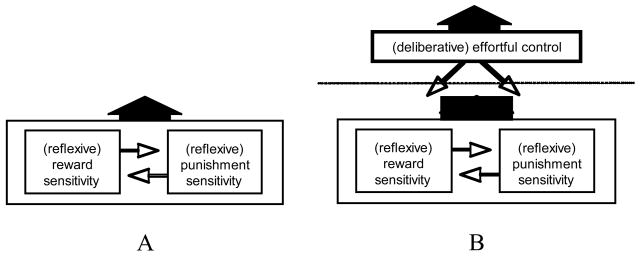Fig. 1.
Three temperamental influences on behavior. Panel A shows a reactive temperament for approaching rewards and a reactive temperament for avoiding punishment compete for influence; in the absence of effortful control (whether due to early stage of development, individual differences, or situational pressures), the resultant from that competition is expressed behaviorally. Panel B shows how the engagement of an emergent effortful control system permits the resultant from the competition of the reactive systems to be overridden, thus dampening the role of the reactive systems in behavior. This figure reflects various statements by Rothbart, Eisenberg, and others; it is reproduced from Carver, Johnson, & Joormann (2008).

